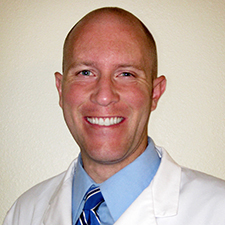With the Match ranking process coming to a close Feb. 22, some medical students may still be fretting over their program choices. Fortunately, according to one resident, students can make the process easier—and get better results—by simply allowing personal needs to guide their decision-making.
Tyler Andre, MD, is a chief resident of the emergency medicine program at Western Michigan University School of Medicine, in Kalamazoo. After growing up in Orange County, Calif., and completing undergraduate medical education at the University of California, Davis, School of Medicine, he hardly expected to end up in southwestern Michigan for his residency. But he found it to be a good fit with his family and his personality, so he made sure to include the Western Michigan program in his ranking.
“Emergency medicine is slightly different from some of the other residencies in that there are three-year and four-year programs. Western Michigan is a three-year program, and I was married with four kids, so I thought if I could shave a year off, that would be great,” Dr. Andre said. “Another thing I looked at was the cost of living. Not as many people care about that, but I did because of my family situation.”
And while he has become very happy with life in Kalamazoo, he noted that small-city life is not for everyone, and reconciling one’s social needs with the opportunities available at each residency is central to a successful Match. He knows of a resident in his program who wants so much to be in a big city that the resident spends days off driving to and from Chicago, two and a half hours away.
“It’s not healthy for a resident to not like the place they’re in,” Dr. Andre said. “The thing I tell students often is, ‘A resident who is happy in residency is going to learn more, work harder and study smarter because they’re in a good place.’ You finish your shift, you go home, you might open a textbook, you might do some practice questions.
“The resident who doesn’t enjoy where they are or the people they’re with will hate going to work, and, after work, will go home and binge-watch Netflix or do something nonproductive in an effort to forget about having to go to work the next day.”
Pick based on personality fit
Residency will provide opportunities to make new friends, he noted. Many will come through the training program itself, and this should be kept in mind when making a rank list.
“Now that I’ve done it, I think the top thing to look for is your personality fit with the program,” he said. “I had friends who wanted to go to a program in Los Angeles because they were excited by the idea of lots of gunshot and knife wounds, but they learned after matching there that that wasn’t what they really wanted. You can find out how well you’re going to like a program based on the people you interviewed with and whether they seem happy and you get along with them.”
With the clock ticking on ranking and Match Day, Dr. Andre suggests making a conscious effort to detach from the anxiety of the experience.
“Once you’ve made your list, just know it’s out of your hands and stop worrying about it,” he said. “For me, it was very easy to kind of forget about it. That was surprising. I had a feeling of, ‘Well, I did all I could do.’ I thought it would be more nerve-wracking than it was.
“And when you open your envelope and realize where you’ve matched, if it’s not your No. 1 choice, don’t freak out about it. You interviewed at more than one place because the likelihood that you’re going to your No. 1 isn’t a hundred percent. You’re going to get good training no matter where you match.”
Those who get upset about where on their list they match often end up regretting it, Dr. Andre said, because they usually go on to have great experiences. So be prepared, and happy, to go to any program on your list.
“It’s safe to say that med students and physicians are fairly competitive individuals, but the Match process is not a competition,” he noted. “Those who rank and match at their No. 1 location are not better students or residents or physicians than those who matched somewhere down their list. I think there’s an unjust sense of pride in those who match with their No. 1, and a misguided sense of failure in those who don’t match with their top choice.
“I have a friend who matched with a program that was fifth or sixth on his list. He was already planning out a certain life at a different program, and when he didn’t end up going there, he was so disenchanted that he thought about not even doing residency and maybe pursuing a different field. But now he’s very happy where he is and he has even met his fiancée. He put himself through a lot of unnecessary turmoil.”
Dr. Andre matched about halfway down his list, and he has no regrets. In fact, if he could do Match ranking again, he said he would rank his program No. 1.
“I was picking based on geography and not the best fit with my personality,” he said. “I absolutely love it here and have considered staying for life."
More on Match
Check out other Wire posts and follow #MatchThrowback during Match week for additional insights from residents and fellows, including their Match Day memories. Also, share where you matched using #Match2017.




